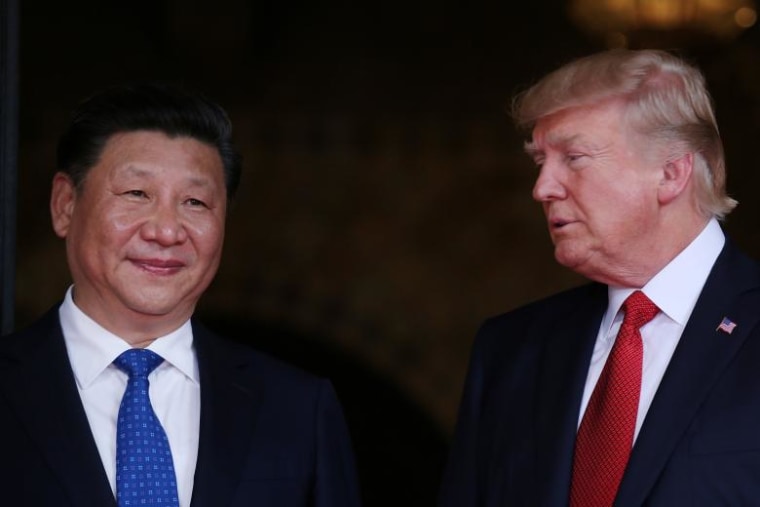Economists are steeling themselves for potential diplomatic and economic disruption if President Donald Trump makes good on his threats to impose barriers on steel imports to the United States.
They warn of major ripple effects that these protectionist policies — whether they come in the form of tariffs, quotas or some combination of the two — would have, not just on America’s steel industry, but on the broader economy and trade infrastructure.
Last week, 15 former Chairs of the President’s Council of Economic Advisers from across the political spectrum wrote an open letter to Trump, urging him to consider the “harm of imposing tariffs on steel imports.” The missive laid out the arguments against tariffs, both diplomatic and economic.
“Not only do you have these direct effects of higher prices in terms of steel... It could have spillover effects on other industries, as well, if you do get the retaliation,” said Jay Bryson, a global economist at Wells Fargo Securities.
Trump Unfazed, Undecided?
“Tariffs would raise costs for manufacturers, reduce employment in manufacturing, and increase prices for consumers,” the letter from former CEAs said.
If Trump read the letter, it didn’t show: Late Wednesday, he said he was open to using both quotas and tariffs to restrict steel imports.
“Maybe I'll do both," Trump told reporters Wednesday evening on board Air Force One.
Quotas could give the administration more leeway in terms of accommodating certain trading partners, perhaps by allotting them an amount that roughly aligned with the amount of steel they export to the U.S. anyway.
“TRQ [tariff rate quota] is a gift to the foreign suppliers for the amount that comes under that cap,” said Gary Hufbauer, a senior fellow at Peterson Institute for International Economics. “Those who are still able to supply to the U.S. market, they get the benefit of the higher prices.”
Economists are in agreement that higher prices are an unavoidable consequence — giving a short-term boom to domestic producers at the expense of American companies and consumers, both of which could wind up paying more for everything from car parts to construction equipment.
Ultimately, economists say it doesn’t matter if barriers to imported steel come in the form of tariffs or quotas in terms of how our international trading partners would respond.
“Any restrictions would lead to retaliation by foreign countries and considerable unhappiness by steel users in this country,” Hufbauer said.
“The indirect ramifications are clearly the more significant here,” said Citi Research global economist Ebrahim Rahbari.
Trump’s assertion that the U.S. steel industry has been a target of foreign trade interests isn’t entirely off-base, Hufbauer said, but it is an issue that has been aggressively policed over the years, with more than 150 such cases.
Related: Steel Imports 'Threaten National Security,' Says Trump
“The steel industry is the most active industry in the U.S. in terms of bringing trade remedies claiming that foreign suppliers are dumping,” he said.
Chinese steel — against which Trump had railed frequently on the campaign trail — represents a small and shrinking percentage of U.S. steel imports, a point Trump did at least seem to acknowledge on Wednesday with his reference to "not only China, but others.”
Today, China represents only about 3 percent of American steel imports. Instead, most comes from a variety of sources including Canada, South Korea and Germany. But the greater the scope of any tariffs or quotas, the greater costs to American companies and and workers.
“If you put a tariff on all that, it would clearly jack up prices,” Bryson said. “American producers would feel emboldened to raise prices as well,” he said, and all the companies that use steel would have to pay those higher prices.
Higher Steel Costs = Higher Unemployment
Research shows that those higher prices cost jobs. When George W. Bush implemented steel import tariffs in 2002, the results rippled far into the broader labor market.
“Every U.S. state experienced employment losses from higher steel costs,” a 2003 analysis prepared for the nonprofit Consuming Industries Trade Action Coalition Foundation determined. In total, it estimated that 200,000 American jobs — a larger number than the entire steel industry employed at the time — were lost as a result.
The other, potentially larger, problem is the means through which the Trump administration has signaled it might restrict steel imports, by invoking a little-used trade provision that permits the implementation of tariffs or quotas when national security is at stake.
Many of the “others” Trump referenced who import steel to the U.S. are not only key trading partners, but military allies as well, undercutting the administration’s argument that restricting steel imports is in the interest of America’s national security.
“I would say it probably goes beyond the economics, as it does undermine multilateralism in general,” Rahbari said.
The Start of a Trade War
Invoking national security to block steel imports is likely to backfire, said Chad Bown, a senior fellow at the Peterson Institute for International Economics.
Other countries would either challenge the decision — leading to a potential showdown with the World Trade Organization, an agency for which Trump has already made clear his disdain — or would deploy the same line of reasoning to protect their own domestic industries and restrict American exports.
“The national security argument really threatens the rules-based trading system,” Bown said. “That opens up a Pandora’s box where any country can make that argument.”
It is a slippery slope, Citi Research chief economist Willem Buiter warned, that could encompass any number of export-dependent economic sectors. “Food, IT, anything cyber-connected could be strategic — it is a wide-open door,” he said.
